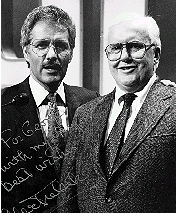Jeopardy

Alex Trebek and George Soule
Reflections on Jeopardy
by George Soule
Revised from the St. Paul Pioneer Press
November 5, 1991
If you watch Jeopardy you'll probably tune in this year's Tournament of Champions, which began Monday. Next to Wheel of Fortune, Jeopardy has the largest audience of any syndicated show, and its ratings peak during this tournament. Even though I lost out in the first round last year, I'll be watching too.
Jeopardy has no glamorous Vanna, no glittering boats and cars glittering, only a few flashing lights. We contestants are rarely beautiful, and though the dollar amounts are generous, they are not always overwhelming. (I admit I was overwhelmed when I won $25,000 as the Senior Tournament champion.)
Why do people try to get on the program? Would-be contestants pay their way to Los Angeles to take tough tests which only about ten per cent survive. If you pass, they may not call you. Even if you appear, the odds are that you won't win any money. The answer is that Jeopardy is first of all a challenge. (Money did not even cross my mind until near the end of my tournament.)
Jeopardy is popular because it is intelligent. That makes it a rare bird in television's wasteland. Alex Trebek is smart, and the contestants are not only smart but agile of mind. The questions are interesting--sorry, I mean the answers are interesting. The show's most obvious show biz touch is that you're not asked questions, but are given answers to which you must supply the question. Merv Griffin tells us that his wife supplied this gimmick.
It may also be popular because it is civilized. We like seeing people talking lucidly, with wit and good manners. They are not mindless gigglers and clappers, but people who say interesting things. The program is the latest of a line polite programs that stretches back to What's My Line? and radio's Information Please.
The producers of Jeopardy know what they're doing. Vanna, however lovely, would be wrong for this show. They replace the stunning Las Vegas brilliance of Wheel with deep blues and reds. The stage is half dark while contestants write down their Final Jeopardy answers. The famous Jeopardy tune (another Merv contribution) induces contemplation, not excitement. And, unlike other game shows, in Jeopardy we see how the show is mounted: the back of the audience's heads, the spotlights and the cameras. We even get a glimpse of technicians preparing the set for the last question. Jeopardy is saying to us, "This program is real in the way others are not."
But a good part of Jeopardy's effect goes deeper. I suspect that a great deal of its appeal comes from what information it draws upon. Recently, E. D. Hirsch Jr.'s book Cultural Literacy has argued that many Americans are at a disadvantage because they do not possess the basic vocabulary of our culture. To be part of American life, Hirsch maintains, one must recognize MacArthur (Douglas), Macbeth, Machiavelli, Mach number, macho, macroeconomics, Madagascar, Dolley Madison, Madrid. Don't these sound like Jeopardy categories?
What you should know to be culturally literate (and to win on Jeopardy) is largely the core of contemporary culture and the legacy of Western civiliaztion. Critics accuse Hirsch of being elitist. Hirsch replies that this information is not necessarily the best information or the only information worth having. It is simply "the information actually possessed by literate Americans" which enables them to talk to each other.
Even though Vanna does not turn its numbers, Jeopardy is a game show like other game shows. It has questions, contestants and (thank goodness) prizes. But it appeals particularly to those viewers who enjoy joining in with the contestants on the screen and in a sense comparing notes on information which is common property. When viewers play along, they are expressing their hope for a national common ground.
But Jeopardy is still a game show. It's appeal depends on the way knowledge is presented, both to contestants and to viewers. To give answers and ask for questions may be just a Merv gimmick, but who knows? The answers are formulated to give two or three clues, some obscure and some suggestive, leading up to the most obvious one. Alex's The Jeopardy Book gives an example: under Presidential Ailments they said "A confirmed hypochondriac, he was in constant pain because of false teeth." The opening of the clue talks about something most people don't know, but grade-school memories are triggered by the false teeth. Wooden ones, I recall. George Washington!
So it is Merv's format that brings off Jeopardy's greatest pleasure, the little explosion in your head when you put the clues together to guess the answer, an explosion that gives you the sensation that you suddenly know something you didn't know you knew. This moment of recognition is not much different from the one when you guess the phrase on Wheel of Fortune (also a Merv show). But combine it with a hope for national harmony and is potent indeed.
More egalitarian too. Comparable British game shows, like Brain of Britain and Mastermind, ask viewers to marvel how extraordinarily intelligent their contestants are. In contrast, Jeopardy is a game of discovery, not just information. It celebrates the audience's moments of discovery as much as the moments of the contestants. It tries to make all of us part of this national game.